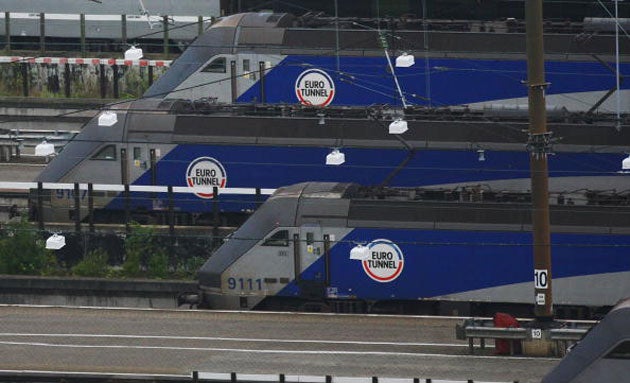Blaze may disrupt Eurostar services for several months

Your support helps us to tell the story
From reproductive rights to climate change to Big Tech, The Independent is on the ground when the story is developing. Whether it's investigating the financials of Elon Musk's pro-Trump PAC or producing our latest documentary, 'The A Word', which shines a light on the American women fighting for reproductive rights, we know how important it is to parse out the facts from the messaging.
At such a critical moment in US history, we need reporters on the ground. Your donation allows us to keep sending journalists to speak to both sides of the story.
The Independent is trusted by Americans across the entire political spectrum. And unlike many other quality news outlets, we choose not to lock Americans out of our reporting and analysis with paywalls. We believe quality journalism should be available to everyone, paid for by those who can afford it.
Your support makes all the difference.Cross-channel services could be disrupted for several months because damage to the Channel Tunnel in Thursday's blaze was more serious than originally thought, French officials said yesterday.
A 700m section of the eastbound tunnel was severely burnt – almost the same distance as in the 1996 fire that shut one of the twin tunnels under the Channel for six months.
The other single-track tunnel is unscathed and was poised to reopen today, which should relieve some of the chaos and confusion for tens of thousands of travellers. However, a complete service cannot resume until both tunnels are open.
The separate, southerly – normally eastbound – bore of the tunnel which was untouched by the blaze reopened to freight shuttles last night after Eurotunnel ran a series of test trains between Calais and Folkestone. Passenger services were expected to resume at 6am today.
However, east and westbound trains could be forced to enter the remaining single track of the tunnel in alternate groups, making for a reduced and somewhat slower service.
Trains could also run along a section of the eastbound or "north" tunnel and then use one of two crossing points to avoid the damaged section. A full service will not be possible until both bores of the tunnel are fully open but officials said that every effort would be made to run as many trains as possible.
The blaze, which reached temperatures over 1,000C and took 16 hours to extinguish, destroyed almost all the 27 lorries and an 800m freight shuttle bound for Calais. Earlier official reports said only three trucks had burnt.
Doubts also emerged yesterday about the probable cause of the blaze. French officials initially said the fire started in the overheated brake system of one truck aboard the shuttle. Eurotunnel rejected that explanation yesterday and said it was too early to say how the fire had started.
Witness accounts by lorry drivers, travelling in a passenger carriage separate from their trucks, spoke of a "series" of explosions. French government officials said they assumed those explosions had been caused by the fire. Despite the date of the blaze – 11 September – government and Eurotunnel officials remain convinced the fire had started accidentally.
Teams of about 50 British and French firefighters fought the blaze from either end of the shuttle train for 16 hours before it was finally subdued at 7am yesterday. Working in difficult conditions, small groups of firefighters took turns to attack the flames in 15-minute bursts.
Technical and criminal investigations were under way yesterday but that is normal French judicial procedure.
On an average day, the Channel Tunnel is used by 49,000 people, 3,800 trucks, 5,800 cars and 55,000 tonnes of freight – carried by 300 different trains.
Many rail passengers, cars and trucks remained stranded on both sides of the Channel yesterday, despite efforts by ferry companies and airlines to provide extra sailings and flights. Eurostar, which had 15,000 passengers booked between London, Paris and Brussels yesterday – and many thousands still stranded from Thursday – said it had proved impossible to find alternative forms of transport for everyone.
Free hotel nights were promised by Eurostar to stranded passengers in Paris, Brussels and London but similar promises proved empty on Thursday night because hotels in Paris were fully booked. Hundreds of London-bound Eurostar passengers had to sleep in their seats in a Eurostar train parked at Gare du Nord.
Thursday's fire seems to have been only marginally less serious than the blaze which closed one bore of the tunnel for six months from November 1996. On that occasion, the intensity of the blaze caused the concrete lining of the tunnel to explode.
The Channel Tunnel Safety Authority then found Eurotunnel guilty of 36 violations of its own safety rules. Eurotunnel has tightened its safety procedures since 1996 but several questions remain outstanding after Thursday's fire.
If the fire did start in one truck – as still assumed – how did Eurotunnel's fire detection devices, both on the shuttle and in the tunnel, fail to pick up signs of smoke or heat until the train was 30 minutes into its 35-minute journey to France? If the truck had overheated before joining the shuttle, why was that not spotted in the standard security checks at the Folkestone terminal?
Join our commenting forum
Join thought-provoking conversations, follow other Independent readers and see their replies
Comments